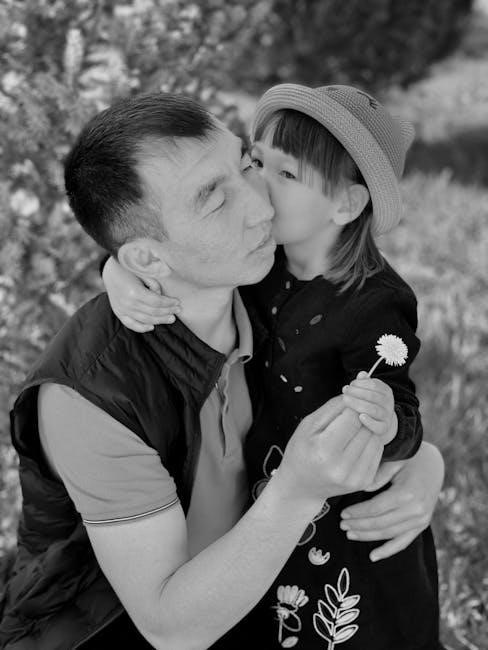The Care Certificate Standard 1 focuses on understanding your role in health and social care. The workbook, available as a PDF, provides detailed answers and guidance for each question, helping learners recognize their responsibilities and expected conduct.
Care Certificate Standard 1 is the foundational module for health and social care workers in England. It focuses on understanding your role, responsibilities, and expected conduct within the care sector. This standard is designed to ensure that new care workers have a clear understanding of their duties and how they contribute to the overall care provided. The workbook for Standard 1 is available in PDF format and includes questions and activities to help learners reflect on their role and responsibilities. Completing this standard is a mandatory requirement for care workers before they can work unsupervised. The module emphasizes the importance of adhering to workplace policies, respecting service users’ rights, and maintaining professional boundaries. It also covers key areas such as communication, equality, and health and safety. By completing Standard 1, care workers demonstrate their commitment to providing high-quality, person-centered care. The PDF workbook and supporting resources are available for download from the Skills for Care website, making it accessible for learners to complete their training effectively.
Understanding Your Role in Health and Social Care
Understanding your role in health and social care is essential for providing effective and person-centered support. This involves recognizing your responsibilities, boundaries, and the expectations placed upon you as a care worker. It is crucial to understand how your actions impact service users and the importance of maintaining professional conduct at all times. This includes adhering to workplace policies, respecting confidentiality, and promoting equality and diversity. A key aspect of your role is communication, ensuring that you listen to and understand the needs of service users while also conveying information clearly. Additionally, it involves working collaboratively with colleagues and other professionals to deliver high-quality care. Understanding your role also requires you to be aware of your limitations and know when to seek guidance or support. By taking responsibility for your actions and continuously reflecting on your practice, you can ensure that you contribute positively to the care environment. This foundation is vital for building trust and providing compassionate care to those you support.
Structure of the Care Certificate Workbook
The Care Certificate Workbook is structured to guide learners through the essential skills and knowledge required for health and social care roles. It is divided into 15 standards, with Standard 1 focusing on understanding your role. Each standard includes an introduction, key areas of competence, questions, and space for answers. The workbook begins with an overview of the Care Certificate, explaining its purpose and the importance of each standard. It then progresses through individual standards, providing clear instructions and prompts to help learners reflect on their practice. Case studies and real-life scenarios are included to apply theoretical knowledge to practical situations. The workbook also contains assessment sections to demonstrate competence. The structure ensures that learners can systematically build their understanding and skills, with each section reinforcing previous learning. This clear and organized format makes it easier for care workers to complete the workbook effectively, ensuring they meet the required standards for their role. The workbook is available for download from the Skills for Care website in PDF format, providing easy access for learners.
Key Areas of Competence in Standard 1
Standard 1 of the Care Certificate focuses on understanding your role in health and social care. Key areas of competence include recognizing responsibilities, maintaining professional boundaries, and adhering to policies and procedures. Learners must demonstrate an understanding of their role within the care team and how it contributes to the broader care system. They should also know how to uphold the principles of safeguarding, equality, and diversity. Another critical area is understanding the importance of communication and how to interact effectively with colleagues, service users, and families. The standard emphasizes the need to take responsibility for one’s actions and decisions, ensuring accountability in practice. Additionally, learners must recognize the importance of personal development and ongoing training to maintain high standards of care. By mastering these areas, care workers can provide compassionate, person-centered care while maintaining professionalism and integrity in their practice. These competences are assessed through workbook answers and practical observations, ensuring learners meet the required standards for their role. The Care Certificate workbook provides detailed guidance and examples to help learners achieve these competences effectively.
Best Practices for Completing the Workbook
To complete the Care Certificate Standard 1 workbook effectively, it is essential to follow best practices. Start by thoroughly reading each question and carefully reviewing the associated guidance in the workbook. Ensure you understand the key areas of competence before attempting to answer. Always refer to your workplace policies and procedures, as they provide context for your responses. Seek clarification from your supervisor or trainer if you are unsure about any aspect of the questions. Use the resources provided, such as the Skills for Care website, to access additional guidance and examples. When writing your answers, be clear, concise, and specific, ensuring they reflect your understanding of your role and responsibilities. Review your answers to check for accuracy and completeness before submission. Additionally, reflect on any feedback provided by your assessor to improve your knowledge and practice. By following these best practices, you can confidently complete the workbook and demonstrate your competence in understanding your role in health and social care;

Importance of Following Policies and Procedures
Fully understanding and adhering to workplace policies and procedures is crucial for all health and social care workers. These guidelines ensure that care is delivered safely, ethically, and consistently, aligning with legal and regulatory requirements. By following policies, workers can minimize risks, protect service users, and maintain professional standards. Policies also provide a framework for decision-making, helping staff navigate complex situations confidently; Failure to comply can lead to adverse outcomes, including harm to service users or legal consequences. Therefore, familiarizing oneself with and adhering to these protocols is essential for delivering high-quality care and upholding the principles of the Care Certificate.
Resources for Downloading the Workbook
The Care Certificate Standard 1 workbook can be easily downloaded from the Skills for Care website in PDF format. This resource is designed to help learners understand their role in health and social care and complete the necessary tasks effectively. Additionally, there are various guides and completed workbooks available online that provide sample answers and tips for each question. These resources are invaluable for care workers who may find certain sections challenging. By downloading these materials, learners can access detailed explanations and examples that align with the Care Certificate standards. This ensures they can complete their workbooks confidently and meet the required competencies. Utilizing these resources is a practical way to gain a deeper understanding of the expectations and responsibilities outlined in Standard 1.

Answering Questions Effectively
Answering questions effectively in the Care Certificate Standard 1 workbook requires clear, concise, and well-structured responses. It is essential to demonstrate a thorough understanding of your role in health and social care, referencing relevant policies and procedures. When completing the workbook, ensure your answers are specific and provide examples where appropriate. This helps to illustrate your knowledge and practical application of the standards. For instance, when asked about responsibilities, explain how you adhere to workplace policies and respect service users’ rights. Use bullet points or short paragraphs to organize your thoughts, making it easier for assessors to evaluate your responses. Additionally, review your answers to ensure they align with the Care Certificate standards and the Code of Conduct for Healthcare Support Workers. By following these tips, you can confidently provide accurate and comprehensive answers that meet the required criteria. This approach not only enhances your understanding but also demonstrates your commitment to delivering high-quality care.
Case Studies and Real-Life Applications

Case studies and real-life applications are essential for understanding the practical aspects of Care Certificate Standard 1. These scenarios provide learners with examples of how to apply the knowledge gained in real-world situations. For instance, a case study might involve a care worker addressing a service user’s concerns about privacy, demonstrating how to uphold dignity and respect. Such examples help learners develop problem-solving skills and understand the ethical implications of their actions. By analyzing these scenarios, individuals can better grasp their responsibilities and how to interact appropriately with colleagues and service users. Real-life applications also highlight the importance of following workplace policies and procedures, such as reporting health and safety concerns or handling complaints effectively. These practical insights ensure that learners are well-prepared to meet the expectations of their role in health and social care. The Care Certificate Standard 1 workbook often includes these types of exercises to reinforce learning and readiness for real-life challenges.
Common Mistakes to Avoid
When completing the Care Certificate Standard 1 workbook, there are several common mistakes to avoid. One of the most frequent errors is not thoroughly understanding the scope of your role, leading to incomplete or incorrect answers. Learners often overlook the importance of aligning their responses with workplace policies and procedures, which can result in failing to meet the required standards. Another mistake is providing overly vague or generic answers, which lack the specificity needed to demonstrate competence. Additionally, some individuals may not fully engage with reflective practice, missing opportunities to critically evaluate their actions and decisions. It is also common for learners to avoid directly addressing ethical dilemmas or challenging situations, which are crucial for showcasing problem-solving skills. To avoid these pitfalls, it is essential to carefully review the workbook questions, seek clarification when needed, and ensure that answers are detailed, honest, and reflective of real-life experiences. Regular feedback from supervisors or peers can also help identify and correct mistakes early in the process.

Completing the Care Certificate Standard 1 is a foundational step for anyone entering the health and social care sector. Understanding your role is not just about meeting requirements but also about delivering high-quality, person-centered care. By carefully reviewing the workbook and avoiding common mistakes, learners can ensure their answers demonstrate competence and a commitment to professional standards. The resources available, such as PDF guides and workbooks, provide invaluable support for navigating the challenges of this standard. Reflecting on real-life scenarios and seeking feedback are key to continuous improvement; Ultimately, the insights gained from Standard 1 lay the groundwork for excelling in the remaining standards and thriving in a care-based career. Remember, understanding your role is the first step toward making a meaningful difference in the lives of those you support.
